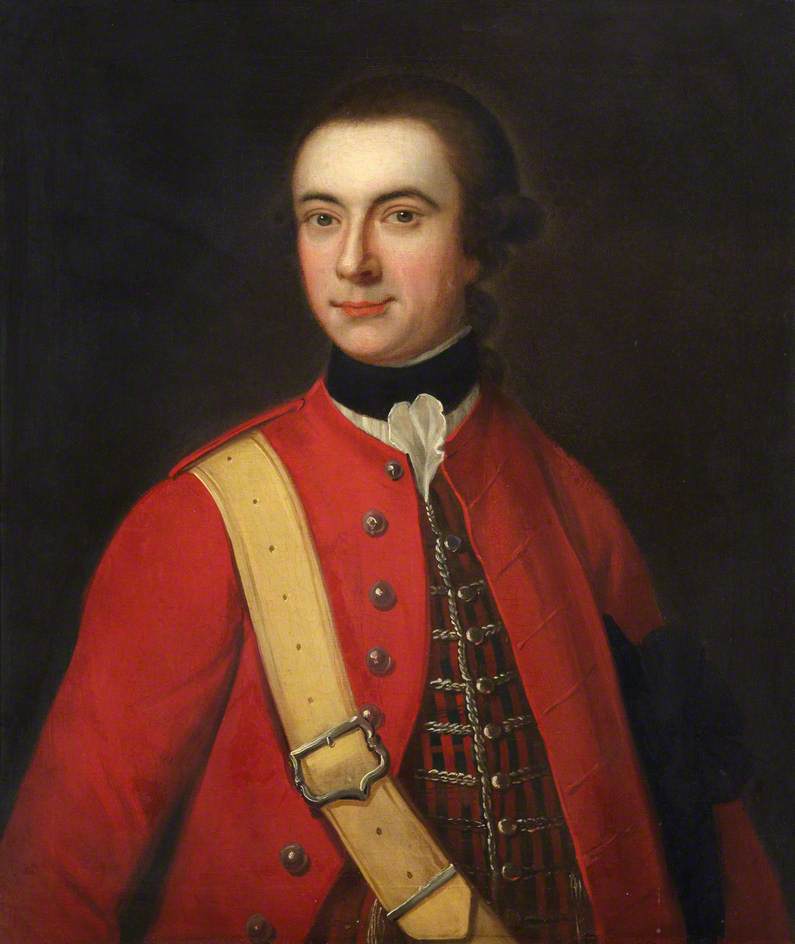This month’s newsletter has almost nothing to do with Blackwater Press. It is all about John Reid. Not our co-founder. The dead one.
CONTENT WARNING: If you don’t want to geek out and learn about an influential 18th-century flutist, this newsletter perhaps isn’t for you. Keep your eyes peeled, though, as a Q&A with our incredible cover designer Eilidh Muldoon is coming soon!
John Reid (1721-1807) was a British army officer, amateur composer, and flute player. He is one of the most significant characters in the history of music in Scotland, and one of my favorite historical characters (Elizabeth typing, btw). A happy coincidence then that I work with his namesake. See the similarity?

John Reid – the original – was born on February 13, 1721 at his ancestral home at Straloch, Perthshire, the son of Alexander Robertson of Straloch. John assumed the last name Reid upon inheriting the estate. Reid comes from the Gaelic Ruadh, or Red. Red Robertson. The family was opposed to the Jacobite cause. John’s father suffered many losses in resisting the 1745 rebellion, and he was commissioned into the British army as a lieutenant in Lord Loudon’s highland regiment on June 8, 1745 in time for the battle of Prestonpans.
John’s career was long and reasonably distinguished. He was nearly court martialed for lying about orders to capture troops in Tongue Bay in 1746, but the attack forced a surrender, so it worked out for his side. He went on to serve in Flanders, and in 1748 purchased a commission in the 42nd Regiment of Foot, better known now as the Black Watch. He was promoted to brevet lieutenant colonel in 1762.

John arrived in the American British colonies in October of that year and defended Fort Pitt from attack by Native Americans in June 1763. The rest of his career was spent in North America; he married the daughter of a settler and purchased 35,000 acres of land in Vermont. This land was seized by colonists in 1774, and the War of Independence prevented him from seeking a remedy. He was promoted to general in 1798.
But his real renown was for music.
The flute was one of the most popular instruments for gentlemen amateur musicians. It was expensive and difficult to play well, therefore requiring a disposable income and leisure time for practice. It was also generally associated with masculinity, war, and seduction. One of the most famous amateur flute players of the eighteenth century was Frederick II of Prussia, better known as Frederick the Great.
Several accounts survive of John Reid’s flute playing. Around 1770, after hearing Reid play in Edinburgh, Alison Cockburn wrote a rather sexually charged account of his performance to her friend Miss Cummings, in which Mrs Cockburn sounds more like a teenaged girl swooning after the latest boy band than a respected society matron describing a flute recital: “Of all the sounds I ever heard (and my soul has soared to heaven before now), Colonel Reed’s flute, well, it is amazing the powers of it. It thrills to your very heart. He plays in any taste you please and composes what he plays. You know my taste is for the penseroso and so it is his. He played me five acts of a tragedy that went to my heart, and I spoke in to myself all the words of it. I would not let him speak the epilogue… He is a gentle, melancholy, tall, well-bred, lean man; and, for his flute, it speaks all languages. But those sounds that come from the heart to the heart – I never could have conceived it. It had a dying fall – I was afraid I could not bear it when I heard it perfectly. I can think of nothing but that flute…”

So yes, if this account is anything to go by, John Reid was hot!
But his most important legacy to musical culture in Scotland was the codicil to his will. Following the life interest of his only daughter, he left the bulk of his estate to the University of Edinburgh, where he had been educated, to endow a chair in music and start a music department. Reid’s music collection is still intact in the University of Edinburgh’s Centre for Research Collections and offers great insight into the tastes and interests of Scotland’s best-known amateur flute player. The Reid School of Music at the University of Edinburgh is the oldest university music department in Scotland. The first Reid professor, John Donaldson (1789-1865), added an instrument museum to the Reid Hall. This has now moved to St Cecilia’s Hall, where Reid’s portrait once stared me down as I performed the sixth sonata from his first collection on a program during the 2014 Fringe.

Every February 13, the University of Edinburgh hosts a concert in honor of General Reid featuring one of his compositions, as stipulated by the bequest in the codicil. Not this year, however. Instead, I hope you are able to spend February thinking about good-looking officers and listening to inspiring flute music. Keep the smelling salts at hand!
And if you’re at all inclined to read about another famous character from Scottish music history, take a look at our title I Piped, That She Might Dance, by Iain MacDonald, available for pre-order here: https://www.blackwaterpress.com/books

